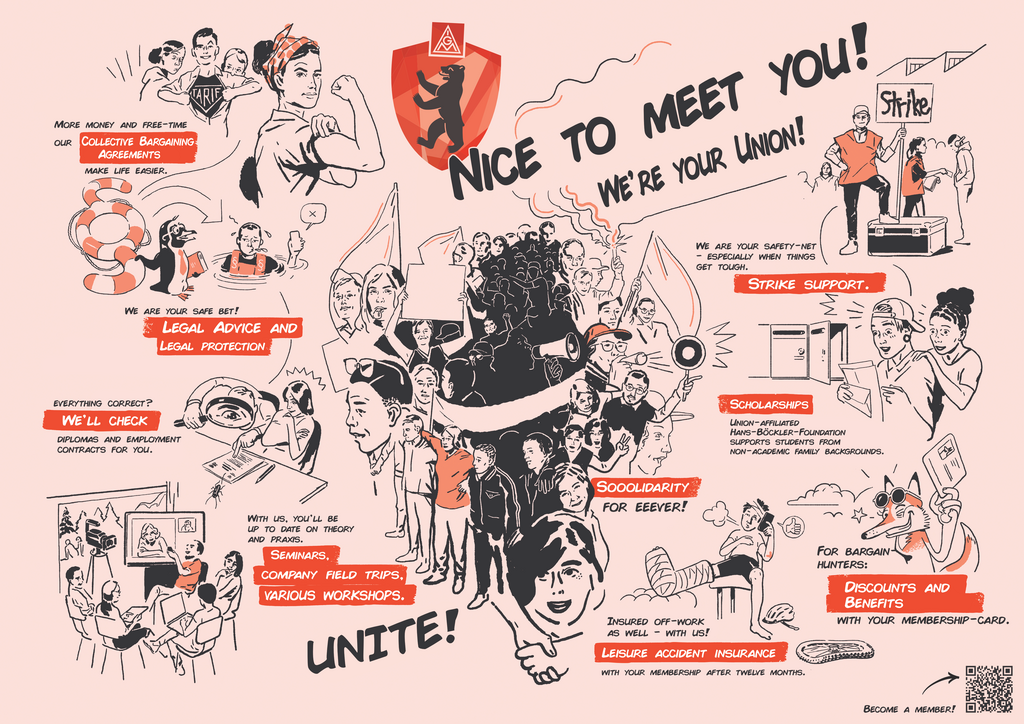Tech & IT
Nice to meet you! We´re your union.
12.10.2023 | Things are happening in the digital economy. Works councils are being established and collective agreements concluded. IG Metall has a lot to offer for employees in the industry. A strong union voice is also important in the current discussions about the future of remote work.
„Governments of the Industrial World, you weary giants of flesh and steel, I come from Cyberspace, the new home of Mind. On behalf of the future, I ask you of the past to leave us alone.“ John Perry Barlow declares the Independence of Cyberspace in 1996 in distinction from the physical world as we know it. He goes on: „You claim there are problems among us that you need to solve. You use this claim as an excuse to invade our precincts. Many of these problems don't exist. Where there are real conflicts, where there are wrongs, we will identify them and address them by our means. We are forming our own Social Contract.“
This techoptimist euphoria was problematic all along, but has clearly faded over the years. If you work in the tech, IT or any related branch you know that there are problems, that are not quite different from the industrial world of flesh and steel. In fact it´s all one inseperable economic system and there are conflicts between employees and employers that cannot be settled over a game of foosball. The knowledge of this has spreaded in the branch over the last couple of years and has led to several foundings of works councils, also in berlin.
But there are issues, that go beyond, what a works council can do- and this is where unions come into play. So the industrial union for metalworkers, IG Metall, might come from the old world but is still indespensable in todays world of work and has still a lot to offer. Dear techies, we´re here for you, too.
Remote work
A big issue of todays world of work is home office and remote work. While many have become accustomed to remote work during the pandemic, these advances are now threatened.
But in the last months the big tech firms and other large corporations started demanding the end of flexible remote work. Furthermore almost two-thirds of CEOs predict a full return to offices by 2026, a a recent survey shows. 87% of global economic leaders think, „that financial rewards and promotion opportunities could be linked in future to office attendance“.
To counter this offense collective agreements can help. Collective agreements in the metal and electrical industries already provide binding guidelines for company agreements on mobile work. An entitlement to mobile work only arises when a voluntary works agreement has been concluded on the subject. As a general rule, works councils, IG Metall and, of course, the employees concerned should be involved in the process of drawing up such collective agreements. After all, even if there is a right to home office or mobile working, it must be ensured that employees can also work on a mobile basis voluntarily in addition to working in the company. If they are also well equipped technically, if there are regulations on accessibility and complete recording of working time, and if labor and data protection are sensibly regulated, mobile working can be forward-looking.
A good example of this was provided by the colleagues at CARIAD with the general works agreement (GBV) "Mobile Working at Home and Abroad“.
For CARIAD's workforce, home office was something practiced and normal. But there were no regulations on mobile working. Especially not for mobile working abroad. That mobile working is allowed is regulated in the CARIAD collective agreement. The works councils negotiated the specific details.
"During the pandemic, our colleagues responded very flexibly and worked from home. It became clear that they are very satisfied when it is made possible for them to adapt their working hours to personal needs and family requirements. And that also applies when colleagues want to work abroad," reports Britta Berlet, negotiator at GBV and Chairwoman of the works council for the north-east region.
What does the central works agreement provide for?
- days of mobile work in Germany are not limited
- mobile work abroad: Currently, there are regulations for six countries, each with 20 working days per country per year.
- maximum flexibility in scheduling working time according to personal interests
- employees decide which work location is optimal for which task
- simple documentation in absence recording
IT Metalls collective agreements
As a trade union, we can use collective agreements to regulate pay or negotiate working hours and inflation compensation premiums. Collective bargaining agreements can also address the threat of corporate splits, job retention and profit-sharing.
Last year, the percentage of IG Metall's collective agreements in the IT sector was based on the good results achieved in the metal and electrical industry and brought employees decent inflation compensation bonuses.

